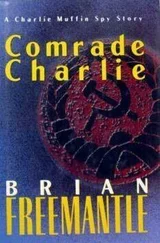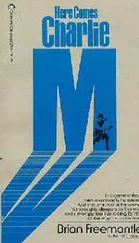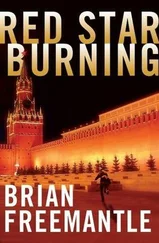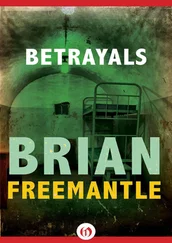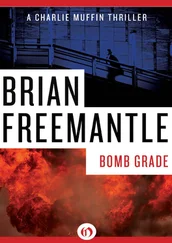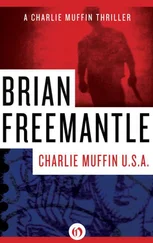Brian Freemantle - Charlie M
Здесь есть возможность читать онлайн «Brian Freemantle - Charlie M» весь текст электронной книги совершенно бесплатно (целиком полную версию без сокращений). В некоторых случаях можно слушать аудио, скачать через торрент в формате fb2 и присутствует краткое содержание. Жанр: Шпионский детектив, на английском языке. Описание произведения, (предисловие) а так же отзывы посетителей доступны на портале библиотеки ЛибКат.
- Название:Charlie M
- Автор:
- Жанр:
- Год:неизвестен
- ISBN:нет данных
- Рейтинг книги:4 / 5. Голосов: 1
-
Избранное:Добавить в избранное
- Отзывы:
-
Ваша оценка:
- 80
- 1
- 2
- 3
- 4
- 5
Charlie M: краткое содержание, описание и аннотация
Предлагаем к чтению аннотацию, описание, краткое содержание или предисловие (зависит от того, что написал сам автор книги «Charlie M»). Если вы не нашли необходимую информацию о книге — напишите в комментариях, мы постараемся отыскать её.
Charlie M — читать онлайн бесплатно полную книгу (весь текст) целиком
Ниже представлен текст книги, разбитый по страницам. Система сохранения места последней прочитанной страницы, позволяет с удобством читать онлайн бесплатно книгу «Charlie M», без необходимости каждый раз заново искать на чём Вы остановились. Поставьте закладку, и сможете в любой момент перейти на страницу, на которой закончили чтение.
Интервал:
Закладка:
‘I got them from Sir Archibald Willoughby,’ reported Charlie.
The girl looked sharply at him.
‘The Director wouldn’t like it if he knew you’d seen him,’ said Janet, formally.
‘Fuck the Director, he’ll know anyway because his watchers followed me, all the time. They were so bloody obvious they should have worn signs around their necks.’
‘It’s still improper,’ insisted the girl.
‘If he doesn’t like it, he can go to Prague tomorrow and put his head in the noose, instead of staying behind in a comfortable office sticking pins in maps.’
The First Secretary, Vladimir Zemskov, was being cautious, judged Kalenin, unwilling to be openly critical before the full Praesidium.
‘It is distasteful to us to have to demand an explanation from such an experienced officer as yourself, Comrade General,’ he said.
Kalenin nodded, appreciatively.
‘But Comrade Kastanazy has made the complaint about the progress so far,’ hardened the Soviet leader. He waited, pointedly. ‘And the consensus of opinion,’ he continued, ‘is that insufficient thought and planning has been put into proposals to repatriate General Berenkov …’
‘I refute that,’ said Kalenin, bravely.
Several members of the Praesidium frowned at the apparent impertinence.
‘… I asked to be given a certain period of time,’ reminded Kalenin. ‘I understood from Comrade Kastanazy that I was being allowed that time. To my reckoning, it has yet to expire …’
‘… There are only a few more days,’ reminded Zemskov. The man was offended, Kalenin saw, and the ambivalent attitude was disappearing in favour of Kastanazy. They’d all follow Zemskov’s lead, he knew.
‘Allow me those days,’ pleaded Kalenin.
‘But no more,’ said Zemskov, curtly.
I won’t need any more, thought Kalenin.
(15)
Charlie invariably grew nostalgic about the East European capitals he visited, trying to envisage the life of centuries before and those years free of concerted oppression when the people delighted in grandiose architecture and extravagant monuments to their own conceit.
‘Prague would have been a women’s city,’ he told himself, in the taxi negotiating its way over the Manesuv Bridge. He stared along the Vlatva river towards the Charles Bridge upon which he was scheduled to meet Kalenin the following day.
‘Please God, make it be all right,’ he mumbled. He became aware of the driver’s attention in the rear-view mirror and stopped the personal conversation. A psychiatrist would find a worrying reason for the habit, Charlie knew.
The car began to go along Letenska and Charlie gazed up at Hradany Castle on the hill. The remains of King Wenceslaus were reported to be there, he remembered. He should try to visit the cathedral before he left.
The reception at the embassy was stiffly formal, which Charlie had expected. It was an embassy unlike most others, in which he had no friends, and he guessed no one there would make it easy. The high-priority message from Downing Street to the ambassador would have indicated the importance of Charlie’s mission, but equally it would have alerted the diplomat to the risk of having his embassy and himself exposed in an international incident that could retard for years the man’s progress through the Foreign Office. It was right they should resent his intrusion, he accepted.
‘I hope to leave within days,’ Charlie assured the First Secretary, who gave him dinner. Charlie’s cover came from the Treasury, checking internal embassy accounts. It was the easiest way for quick entry and exit.
‘Good,’ said the diplomat, whose name was Collins. He was a balding, precise man who cut his food with the delicacy of a surgeon. His attitude reflected that of the ambassador, Charlie guessed.
‘There really shouldn’t be any trouble,’ tried Charlie.
‘We sincerely hope not,’ said Collins immediately.
He was regarded with the distaste of a sewage worker come to clear blocked drains with his bare hands, decided Charlie. Sod them.
‘There is one thing,’ said Charlie, remembering the threat made when the C.I.A. presence had been forced upon the department. It seemed rather theatrical now, but it was a precaution he would have to take.
‘What’s that?’
‘I shall want a gun.’
Collins looked at him, incredulously.
‘A what?’ he echoed.
‘Don’t be bloody stupid, man,’ replied Charlie sharply. ‘A gun. And don’t say the embassy haven’t got one because I had three sent out in the diplomatic pouch a fortnight ago.’
Collins dissected his meat, refusing to look at him.
‘The instructions to the embassy were signed personally by the Prime Minister,’ threatened Charlie, irritated by the treatment. He was behaving just like Ruttgers, Charlie thought, worriedly.
‘I’ll ask the ambassador,’ undertook Collins.
‘ Tell the ambassador,’ instructed Charlie. His anger was ridiculous, he accepted, quite different from his normal behaviour in an overseas embassy. Because of it, the meal became stifled and unfriendly and Charlie drank too much wine. He did it knowingly, anticipating the pain of the following day but needing it to submerge his fear and spurred by irritability. Twice during the dinner, offended at the continued pomposity of the First Secretary, Charlie stopped just short of fermenting a pointless dispute.
He retired immediately after the meal, sitting in the window of the room with a tumbler of duty-free whisky, gazing out over the darkened city. A thousand miles away, he ruminated, an old man for whom he would once have happily died was probably sitting in a window holding a larger amount of whisky, staring out over his rose bushes. The degeneration of Sir Archibald had frightened him, accepted Charlie. He snorted, drunkenly, at the thought. And Berenkov had frightened him and the assignment frightened him.
‘Wonder I’m not constantly pissing myself,’ he mumbled.
Spittle and whisky dribbled down his chin and he didn’t bother to wipe it.
‘Got to stop talking to myself,’ he said.
He slept badly, rarely losing complete consciousness and always aware of himself through spasmodic, irrational dreams in which first Ruttgers and then Sir Archibald pursued him wielding secateurs and he panted to evade them, burdened by the wheezing Braley slung across his shoulders.
He abandoned the pretence of sleep at dawn, sitting at the window again, watching the sun feel its way over the ochre, picture-painted buildings in the old part of the city immediately below him.
He had the hangover he had expected. His head bulged with pain that extended down to his neck and his mouth was arid. It had been a stupid thing to have done and would affect his meeting with the Russian, he thought.
He breakfasted alone, in his room, uncontacted by anyone. Finally he approached Collins’s office, determined to control the annoyance.
‘The ambassador has approved the issuing of a revolver,’ said the meticulous diplomat.
‘Yes,’ said Charlie. He felt too ill to compete with the man, anyway.
The weapon lay on the desk and Collins looked at it but refrained from touching it, as if it were contaminated. Charlie picked it up and placed it in the rear waistband of his trousers, at the small of his back, where it would be undetectable to anyone brushing casually against him and not be a visible bulge unless he fastened his jacket.
He was conscious of Collins studying him, critically.
‘I don’t bloody like it, either,’ said Charlie, venting his apprehension.
It was a warm, soft day and if he hadn’t felt so unwell Charlie would have enjoyed the walk down the sloping, sometimes cobbled, streets.
Читать дальшеИнтервал:
Закладка:
Похожие книги на «Charlie M»
Представляем Вашему вниманию похожие книги на «Charlie M» списком для выбора. Мы отобрали схожую по названию и смыслу литературу в надежде предоставить читателям больше вариантов отыскать новые, интересные, ещё непрочитанные произведения.
Обсуждение, отзывы о книге «Charlie M» и просто собственные мнения читателей. Оставьте ваши комментарии, напишите, что Вы думаете о произведении, его смысле или главных героях. Укажите что конкретно понравилось, а что нет, и почему Вы так считаете.

